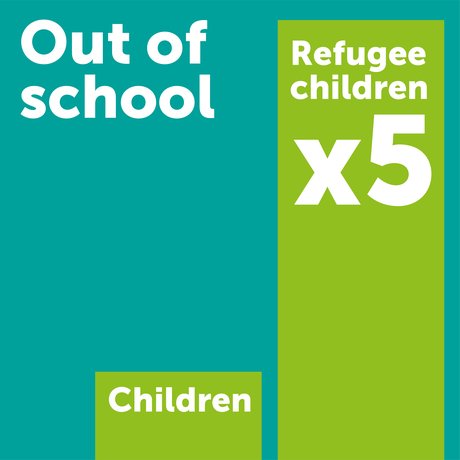Key message
Key challenges
- Crisis and conflict disrupt education. Out of the 224 million crisis-affected children and adolescents of school age, about 72 million are out of school. Financing for refugee education remains largely oriented towards short-term projects that fail to address the protracted nature of refugee crises and do not always reflect needs on the ground.
(ECW, 2023) (Save the Children, 2023) - The number of displaced children is larger today than any time since World War II. Today, 42% of the 84 million displaced people globally are children. One in three children living outside their country of birth are refugees.
(UNHCR, 2022) (UNICEF, 2022) - The circumstances in host countries can restrict access to education. Barriers such as financial constraints and poverty prevent many refugee children accessing an education. Other barriers include high costs of living combined with legal restrictions on the right to work.
(Save the Children, 2017) - Refugees are more likely to be out-of-school. Over 50% of refugee children are not in school, this equates to over 7 million children. The gap between enrolment rates among refugees and non-refugees is large, with far fewer refugees attending school. Average gross enrolment rates for refugees stand at 38% at the pre-primary level, 65% at the primary level and 41% at the secondary level.
(UNHCR, 2023) - Higher education is not a reality for most refugees. Only 7% of refugees have access to higher education.
(UNHCR, 2023) - Refugees face barriers to access quality learning. Refugees are often unfamiliar with the local curriculum and language of instruction, experience safety concerns or may be prevented from progressing in education due to a lack of recognition of prior learning or documentation.
(Save the Children, 2023)
Make the case
- Providing educational opportunities for refugees creates more productive members of society. Education lays the base of foundational skills, preparing students for technical or vocational training, or university-level opportunities, leading to better job prospects and greater self-reliance for refugees.
(UNHCR, 2016) - Schools provide a safe space for refugee children. Without opportunity to attend school, refugees become increasingly vulnerable to child labour, recruitment by armed groups, child marriage, or sexual exploitation.
(UNHCR, 2016) - Schools connect refugees to their host community’s culture and language, creating more tolerant, peaceful societies. Successfully integrating refugees promotes social inclusion, reduces tensions with locals, and creates more equal societies.
(OECD, 2019) - Access to secondary school encourages completion of primary school. The knowledge and skills acquired in secondary school can serve as a key driver for primary school completion, particularly in resource-restricted environments.
(UNHCR, 2019) - Schools can serve as a stabilising force for refugee children, addressing social exclusion and mental health. Education and wellbeing are linked. The closures of education settings during COVID confirmed how important attending school, college or university can be for young refugees' psychosocial wellbeing.
(REUK, 2021) - Quality education provides children with hope for a better future. Access to inclusive quality education creates conditions in which children and youth can learn, thrive and develop their potential; build individual and collective resilience; experience and negotiate peaceful coexistence; and contribute to their societies.
(UNHCR, 2019) - Education integrates refugees into the local economy. It can support immigrants to develop and use their skills, participate in the labour markets of host countries, contribute to welfare arrangements, and feel a general sense of belonging.
(OECD, 2019) - Strengthening the capacity of national education systems to accommodate refugees can benefit local communities too. In Pakistan, more than US$45 million was invested in more than 730 educational projects over nine years. 84% of the 800,000 who benefitted were local Pakistani children, while 16% were Afghan refugees. In Lebanon, the double-shift school system supports public schools which serve both Lebanese and Syrian refugee children. More than 350 public schools now operate this system.
(UNHCR, 2019) (UNHCR, 2018) - Simple, cost-effective programmes can boost refugee enrolment. Cash transfer programmes for refugee children to support their transportation and other education costs can help increase school attendance by 20%, as was found in a randomized control study in Lebanon.
(Hoop et al., 2018)
Key infographic

Refugee children are five times more likely to be out of school than other children and youth around the world
Key opinion

Filippo Grandi
UN High Commissioner for Refugees
For the 1% of the world’s population who are displaced, education is the key to unlocking a positive and resilient future. For children affected by crisis and conflict, education provides vital protection, and a sense of normalcy and safety. COVID-19 showed numerous examples of how refugees who had received support to harness their energy and complete their education were giving back to the communities which hosted them – as doctors, nurses, teachers and support workers. Access to a quality education prepares refugee students to take care of themselves and their communities, stepping up as leaders and role models and enabling rapid generational change which will in turn create a brighter future for their own children.
Key talking points
- A record number of young people are refugees around the world.
- Investing in education for refugees provides hope and opportunity for children who have experienced unthinkable tragedy and disruption to their lives.
- Supporting refugee education can also help improve education for host communities.
- Refugee education creates more tolerant, peaceful societies and helps ensure people are able to contribute to their host communities and be prepared to return home and rebuild their communities.
Share This Resource
Similar Themes






